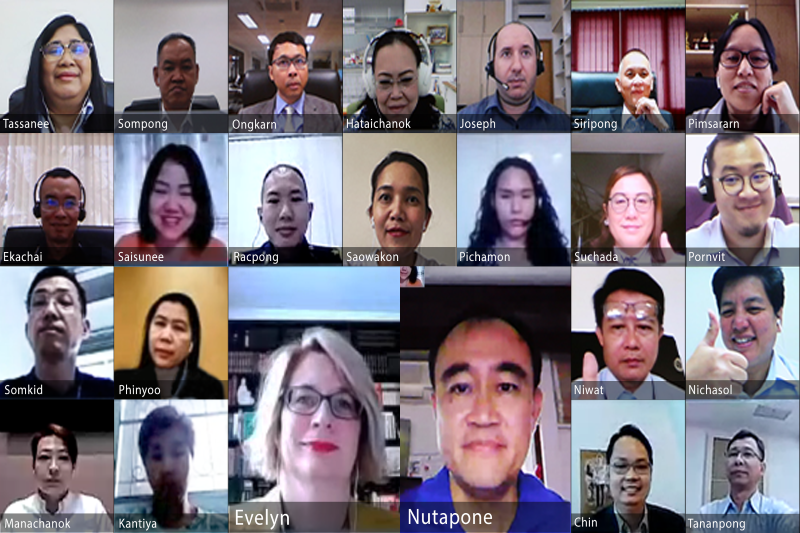
On 21 August 2020 OpenGov Asia organised another highly interactive OpenGovLive! session to inform and empower delegates from a wide spectrum of government agencies in Thailand.
As governments around the world struggle to cope with these stressful times, OpenGov Asia supports them by sharing knowledge on how technology and analytics can help better manage people and nations. The overwhelming attendance and engagement from the Thailand audience was itself a testimonial to the relevance of the topic.

The session opened with a presentation by Mohit Sagar, Group Managing Director and Editor-in-Chief at OpenGov Asia.
Mohit opined that the world is at a crucial point right just now and the decisions governments take currently will shape the way the future looks.
With almost every city shut down or constrained as a result of the pandemic, public services were one sector that was under a lot of pressure; ensuring all citizens had access to basic amenities to survive the lockdown and stay safe.
However, not all services were seeing the same kind of demand, making it critical for governments to identify high priority areas and act accordingly.
During the last few months, governments have also collected a huge trove of data. Driving insights from this data can help them validate decisions for current and future needs.
Not only do governments need to analyse the huge volumes of data, but they also need to rethink their policies and practices in these unprecedented times. They no longer just need to respond to the pandemic and recover from it, they must also learn to and plan to thrive in these times.
Mohit emphasised deploying the latest technology and data analytics tools as a smart and effective way of doing things. He also highlighted that the technology will be effective only when complemented with sound leadership.
He concluded by advising the governments and public sector executives to partner with the champions in technology and use their expertise to serve citizens better.

After Mohit’s presentation, Nutapone Apiluktiyanut, Managing Director, SAS Thailand came forward to share his perspectives with delegates.
Nutapone briefly introduced the audience to SAS and its mission of improving lives through better decision making.
He then shared his observations about the phased approach being followed by governments in tackling the pandemic and how SAS’s data analytics tools support that.
Nutapone presented the three stages highlighted by him:
- Respond
- Recover
- Reimagine
To expound on the Respond Stage, he talked about collaboration with governments in India and the United States to predict their medical infrastructure requirements using SAS’s data analytics.
Similarly, during the Recovery Stage, SAS worked closely with government agencies to prepare them as they were getting ready to reopen their economies. Data analytics helped governments determine their revenue streams, expenses and distribution patterns of stimulus packages.
Nutapone closed by saying that SAS technology can help governments Reimagine the future – to be better prepared for the next emergency well in advance, avoiding loss to lives and resources.

After Nutapone, Joseph Musolino, Global Sales and Strategy Consultant Fraud and Security Intelligence, SAS spoke on the topic from another angle.
Joseph began by sharing interesting statistics that pointed to the fact that organisations globally consider Machine Learning and AI the most significant data initiative for the next year.
Joseph felt that the focus for these countries should now be to take AI and Analytics to enterprises and make both these technologies faster and easier to deploy.
He highlighted some of the areas where governments are currently deploying advanced analytics to strengthen their delivery mechanisms. They include – Customs, Pandemics, Medical, Taxation and Judicial systems.
In order to give the audience a detailed understanding of how exactly the theory plays out, he demonstrated real-life situations where analytics had helped governments serve citizens better.
He concluded by informing the delegates about their new platform which is a step forward into next-gen analytics.
After Joseph’s presentation, Evelyn Wareham, Chief Data and Insights Officer at the Ministry of Business, Innovation and Employment, New Zealand shared her insights on the topic. Her goal was to update all the delegates on the latest developments in data strategy in New Zealand Public sector and specifically in the Ministry of Business, Innovation and Employment.

She began by stating New Zealand’s current vision for data strategy, i.e. a future where data is regarded as an essential part of New Zealand’s infrastructure and where data use is underpinned by public trust and confidence. In the same vein, she also shared the major aims of this vision that include:
- Investing in making the right data available at the right time
- Building partnerships within and outside government
- Implementing open and transparent practices
- Growing data capability and supporting good practice
Evelyn then spoke about New Zealand’s strong integrated data infrastructure that brings together steams of information from Tax, Housing, Census, Education, Benefits, etc. that helps the government make wise policy decisions for the country.
This integrated data structure is of particular importance in the Business, Innovation and Employment Ministry as it helps track indicators of economic growth of the nation.
The aim of this data and the insights are to help the government formulate policy; analytics helps enhance service experience, build operational intel for compliance and enhances performance.
Evelyn also shared some examples of how they are using data analytics currently. During the different stages of the COVID-19 pandemic the government was relying on the various real-time data resources that helped them gauge the status economy and take decisions accordingly.
One example of this is the data on spending that was tracked that helped the government identify the requirements and make suitable fiscal provisions.
Another example of this was a graph that helped the government see how businesses were coping with the pandemic and how it was impacting them.
The last example Evelyn shared was keeping track of travel data across borders to ensure the safety of people in New Zealand.
She concluded by saying that the country is still on a journey towards becoming perfect in using data and analytics to serve the public better.
After Evelyn’s informative presentation, it was time for the polling session. The delegates showed great interest and engagement during the session.
On the first question of the biggest impact on your organisation as a result of the COVID 19 pandemic, a majority of delegates (42%) voted for workforce planning and the need to test resilience of working remotely in both long and short term.
A delegate shared that working from home has been the biggest impact on almost all organisations as nobody was expecting it and they were not prepared for it either. Providing the right infrastructure and ensuring a strong network for all employees as they log in to the systems at the same time was a huge challenge for their organisation.
On the next question of the area where your organisation needs to develop most to respond more efficiently to the next pandemic of such magnitude, the audience was split between integrated operations models to keep the government running (37%) and use of data and analytics to improve situational awareness for real-time decision making (31%).
A delegate shared that they voted for use of data and analytics to improve situational awareness for real-time decision making as governments in this region do not use analysis as much as they ideally should. Using analytics would speed up fundamental processes, giving them more time to work on more complex things.
On the final question of major change in how your department/organisation works due to COVID-19, most of the delegates voted for increased digitisation of back-office administration and processes (55%).
A senior delegate reflected that before using data analytics and advanced technology in our operations, we need to improve our back-office functions from manual to digital. Once that is updated, we can deploy AI/ML or machine learning to enhance our performance.
After the polling session, Joseph addressed the audience with concluding remarks. He thanked and appreciated the audience for taking time out of their busy schedules. He also said that they have only touched the tip of the iceberg for this topic and there is so much to share and discuss.
He encouraged delegates to reach out and engage in more discussions about analytics and the surrounding ecosystem.
















